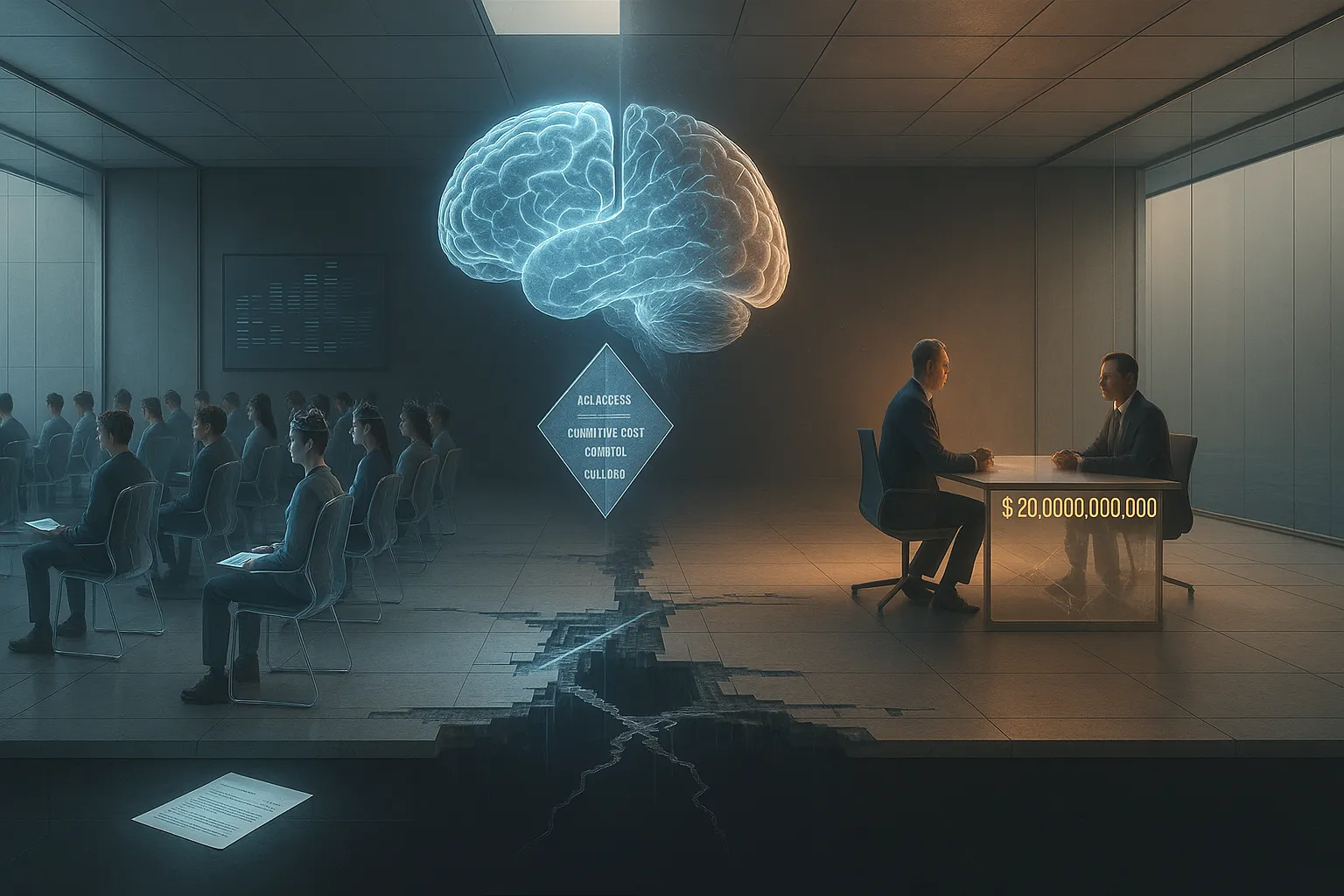Good Morning from San Francisco,
🔥 OpenAI executives floated antitrust complaints against Microsoft as their partnership implodes. The "nuclear option" emerged during heated talks over OpenAI's corporate restructuring. Microsoft holds veto power over the conversion. Without approval, OpenAI loses $20 billion by December. 💸
🧠 MIT researchers hooked 54 students to brain monitors while they wrote essays. ChatGPT users showed weaker neural activity. Their brains went idle. Memory suffered most—83% couldn't quote their own writing minutes later. 📝
The kicker: brains adapted to expect AI help. Students couldn't snap back to normal thinking when writing alone. Their essays started sounding identical too. 🤖
Your mind gets lazy when machines do the work. ⚡
Stay curious,
Marcus Schuler
OpenAI Considers Antitrust Nuclear Option Against Microsoft
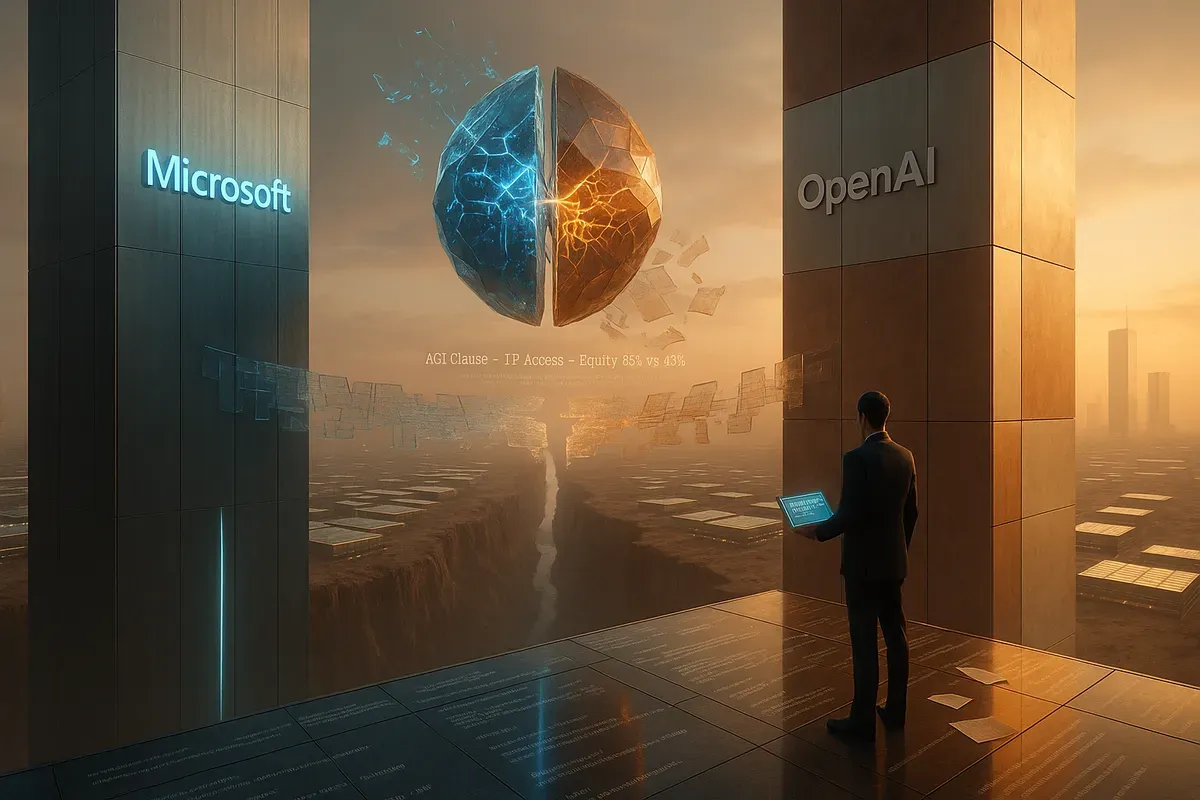
OpenAI executives discussed accusing Microsoft of antitrust violations as their AI partnership breaks down. The Wall Street Journal reported Monday that OpenAI leaders consider this a "nuclear option" to pressure Microsoft in tense restructuring talks.
The stakes are massive. OpenAI needs Microsoft's approval to convert into a for-profit company. Without it, the startup risks losing $20 billion in funding by year-end. But negotiations have grown so difficult that OpenAI might file federal complaints against its biggest backer.
The latest fight centers on OpenAI's $3 billion acquisition of coding startup Windsurf. Microsoft's contract gives it access to all OpenAI technology, including acquisitions. OpenAI wants to block Microsoft from Windsurf's code because Microsoft offers competing tools through GitHub Copilot.
Microsoft wants more than OpenAI offers. The companies disagree on Microsoft's stake in the restructured company. OpenAI proposed 33% equity for Microsoft in exchange for giving up current profit-sharing rights worth up to 49% of future earnings. Microsoft rejected this and demands more concessions.
Both companies are preparing for separation. Microsoft hired rival AI talent and added competing models to its Azure platform. OpenAI struck computing deals with Oracle and Google Cloud, reducing dependence on Microsoft's servers.
The breakdown threatens enterprise customers using Microsoft's AI tools. Companies in healthcare and finance face the biggest risks from potential service disruptions. The partnership that fueled both companies' AI dominance is cracking apart over control and money.
Federal regulators already watch this relationship. The FTC opened an antitrust investigation into Microsoft last year. If OpenAI files formal complaints, it hands regulators a willing witness against one of tech's biggest players.
Why this matters:
- Tech's most successful AI partnership breaking down would force every company to rethink vendor strategies and partnerships
- Enterprise customers betting on Microsoft-OpenAI integration face major risks if the relationship collapses
Read on, my dear:
AI Image of the Day
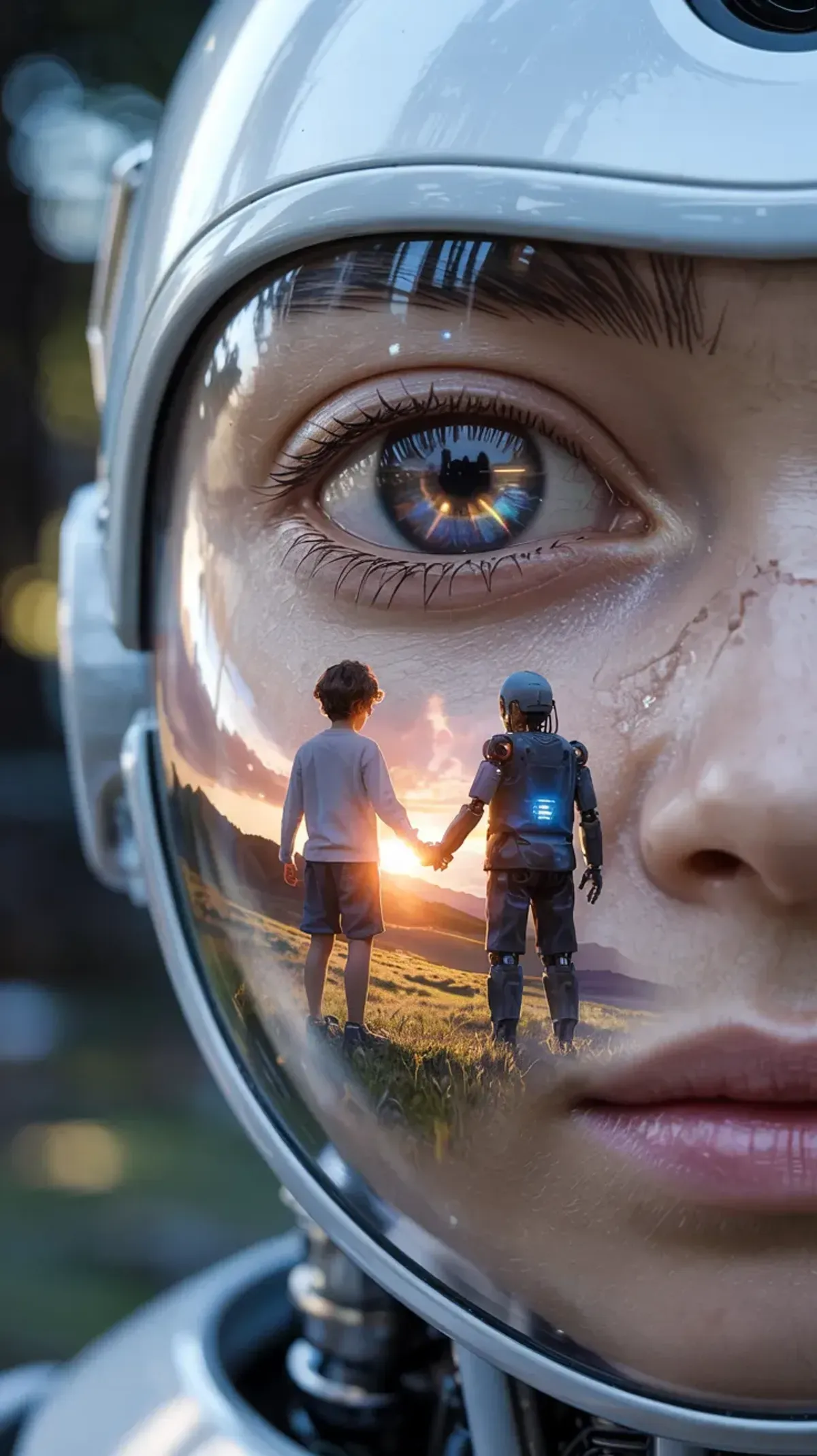
Prompt:
“The New Dawn” Prompt: Extreme close-up of a
sunrise reflected in the mirrored eye of a next-gen android. Reflection shows a human child and robot hand clasped together on a grassy hill. Micro-scratches on the lens, photorealistic iris circuitry glowing faintly. Warm golden hour light, cinematic film grain, depth-of-field blur. 🧠 Theme: Hopeful future with AI and humanity coexisting in peace. 🎥 Inspiration: Like an ending frame of a Spielberg sci-fi drama.
What Happens to Your Brain When AI Writes for You?
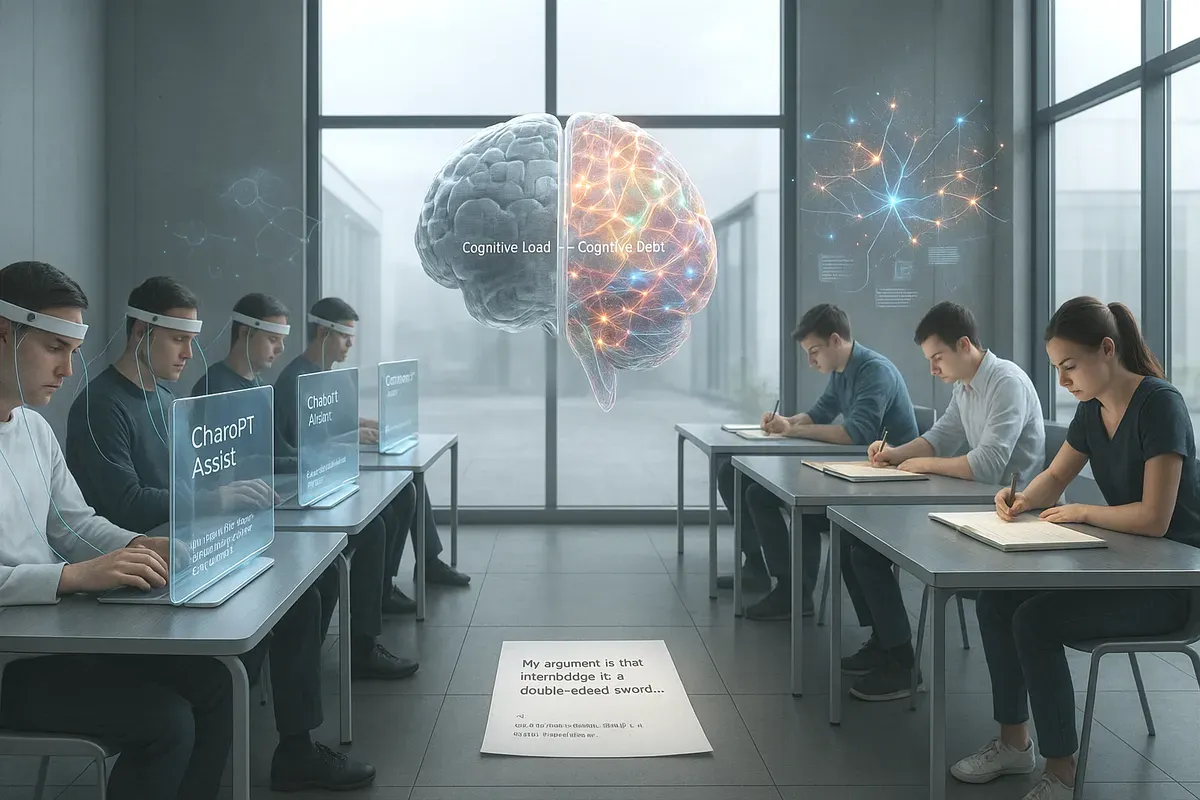
MIT researchers hooked 54 students up to brain monitors and watched what happened when they wrote essays with ChatGPT, Google, or just their own minds. The results show AI assistance comes with a hidden cost.
The students who used ChatGPT showed weaker brain activity across all frequency bands. Their neural networks barely talked to each other. Meanwhile, students writing without help fired up strong connections between brain regions, especially areas that handle memory and deep thinking.
The memory test revealed the starkest difference. When asked to quote from essays they had just written, 83% of ChatGPT users failed. Students who wrote independently quoted themselves accurately.
The cognitive debt trap
Brain scans revealed something researchers call "cognitive debt." ChatGPT users offloaded so much mental work to the AI that their brains essentially went idle. This created immediate relief but long-term problems.
When ChatGPT users switched to writing alone in later sessions, their brains couldn't snap back to normal. They still showed weaker neural activity than students who had been writing independently all along. The AI had essentially trained their minds to expect help.
Your essays start sounding like everyone else's
Language analysis found another troubling pattern. Essays written with ChatGPT looked increasingly similar to each other. Students lost their individual voices and started converging on the same AI-generated phrases and structures.
Students writing independently produced the most diverse and creative language. Google users fell somewhere in between, picking up SEO-optimized keywords but maintaining more originality than the AI group.
Why this matters:
- AI writing tools may weaken the exact thinking skills they claim to enhance
- Your brain adapts to expect AI help, making independent thinking harder over time
Read on, my dear:
🧰 AI Toolbox
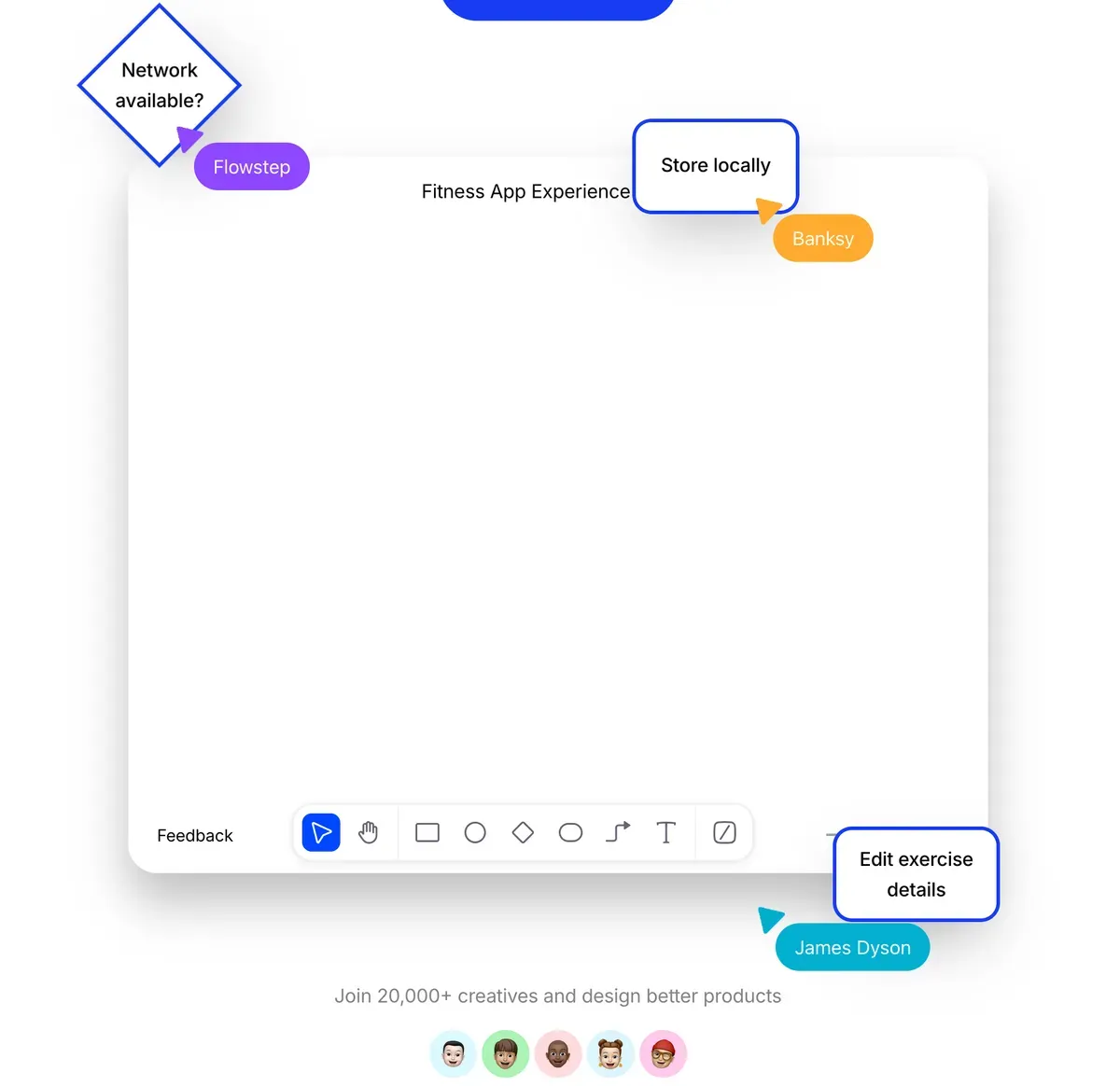
What is Flowstep?
Flowstep is your AI design assistant that transforms simple text prompts into UI designs, wireframes, and user flows in seconds. Think of it as ChatGPT for design. You describe what you want. It builds it.
Getting Started
Step 1: Sign Up
Visit flowstep.ai and create your account. Flowstep is entirely free to use.
Step 2: Your First Design
- Describe your idea in plain English
- Example: "Design a mobile login screen with email, password, and social login options"
- Be specific but natural
- Hit generate and watch the magic happen
- Multiple design options appear instantly
- Choose wireframes or high-fidelity mockups
- Iterate quickly using built-in suggestions
- "Next screen" generates logical follow-ups
- "Error states" adds validation designs
- Custom prompts refine details
AI & Tech News
Applied Intuition Hits $15 Billion After $600 Million Round
Applied Intuition just raised $600 million and reached a $15 billion valuation, more than doubling from $6 billion last year. The startup builds AI software for autonomous vehicles, drones, and defense systems, working with 18 major automakers including Volkswagen and Toyota to make their cars safer and smarter.
Streaming Finally Beats Cable and Broadcast TV Combined
Americans watched more streaming than cable and broadcast television combined in May, marking the first time streaming won a full month. Netflix and YouTube led the charge, while cable networks turned into zombie channels running endless "Law & Order" reruns as media companies abandoned original programming to fund their streaming platforms.
Roblox Farming Game Breaks Every Gaming Record
Grow a Garden, a simple farming game on Roblox, hit 16.4 million concurrent players Saturday - more than Fortnite's peak and bigger than the top five Steam games combined. The game lets players plant seeds, collect pets, and trade items for in-game currency, with 35 percent of its players under 13 years old.
Meta Adds AI Video Tools to Advantage+ Ad Platform
Meta launched new AI features for Advantage+ at Cannes Lions, including tools that turn static images into videos with animations and music. The platform now lets advertisers maintain consistent branding across campaigns and uses AI to pull key phrases from videos to highlight product benefits, though video features remain in testing.
Meta AI Adds Warning After Users Accidentally Share Personal Details
Meta added a warning popup to its AI app after users accidentally shared personal information on the public feed, including conversations about family problems and pocket dial recordings. The new system requires users to tap an extra confirmation before posting, after Business Insider found the feed filled with embarrassing overshares that appeared unintentional.
Daniel Ek Backs German AI Weapons Startup at $13 Billion Value
Spotify founder Daniel Ek led a €600 million investment in Helsing, valuing the German defense startup at €12 billion and making it one of Europe's most valuable private companies. The Munich-based firm builds AI software for military systems and now produces its own drones, submarines, and aircraft while supplying thousands of strike drones to Ukraine from its German factory.
Tinder Brings Back Double Dating Feature After 2017 Flop
Tinder is relaunching its double dating feature in the US after shutting it down in 2017 due to privacy concerns and confusion about its purpose. The new version lets users invite friends to match with other pairs on the app, targeting younger daters who prefer meeting people through friends rather than solo swiping as Tinder's paying user base has dropped from 11 million to 9.1 million since 2022.
🚀 AI Profiles: The Companies Defining Tomorrow
Wisprflow: Turning Speech Into Text at Startup Speed
This voice-first AI company wants to kill your keyboard. Founded by two Stanford grads frustrated with typing speeds, Wisprflow builds software that transcribes speech faster and more accurately than you can type.
The Founders • Founded 2021 by Tanay Kothari and Sahaj Garg in San Francisco • 25+ employees (estimated) • Kothari sold previous startup FeatherX; Garg led AI at chip startup Luminous • Original vision: neural interfaces that read intended speech from biosignals • Pivoted 2024 from hardware to software when reality hit 🤖
The Product • Wispr Flow: AI voice dictation across Mac, Windows, iOS • Works in any app - email, docs, code editors, chat • Smart editing fixes mid-sentence changes automatically • Command Mode: "Flow, make this shorter" rewrites selected text • Whisper mode for quiet environments • 100+ languages supported • Free tier: 2,000 words/week; Premium: $12/month unlimited
The Competition • Direct rivals: Aqua Voice, Superwhisper, Talktastic • Big Tech built-ins: Siri, Google Assistant, Dragon (Microsoft/Nuance) • Aqua claims faster speeds and better accuracy 👀 • Advantage: 3+ year head start, specialized engineering team • Challenge: Changing century-old typing habits
Financing • $26M total raised across seed rounds and Series A • Backed by NEA, 8VC, Coinbase co-founder Fred Ehrsam • Latest $12M Series A (Sept 2024) led by Matt Kraning • 19% free-to-paid conversion rate • 60% month-over-month revenue growth (early 2025) • High eight-figure valuation (estimated)
The Future ⭐⭐⭐⭐ Strong fundamentals with proven product-market fit and rapid growth. Voice interfaces are having their iPhone moment as AI accuracy improves. Risk: crowded field with tech giants circling. But if anyone can make us talk instead of type, it's these guys.



